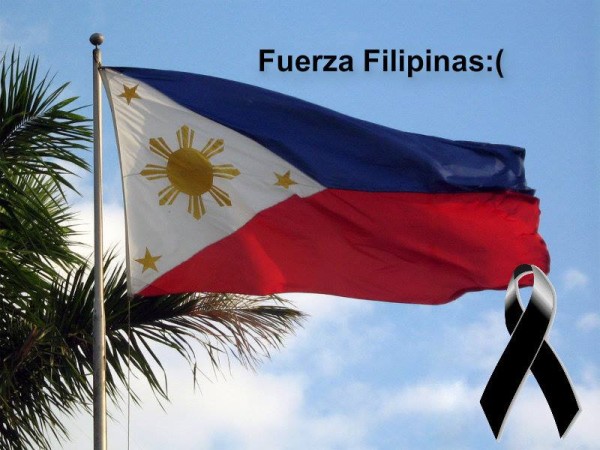At the United Nations climate talks in Poland, Philippines representative Yeb Sano, in an emotional speech that “brought tears to the eyes of other delegates and a standing ovation,” as reported by the BBC, linked the staggering devastation to a changing climate. Sano said he would fast during the two-week conference, “until progress is made” and talks lead to a “meaningful outcome” – little chance of that though!
Naderev “Yeb” Sano, whose family comes from the city of Tacloban which was worst hit by the devastation of Typhoon Haiyan (locally called Yolanda), made his tearful appeal for international action at the start of the two-week summit in Warsaw.
It is a widely reported thought that climate change will mean more intense tropical storms though
scientists say single weather events cannot conclusively be linked to global warming. Also, the link between man-made warming and hurricane activity is unclear, though rising sea temperatures do cause stronger energy releases over oceans and rising sea levels are making low-lying regions more vulnerable to storm surges.
In her opening speech at the talks, UN climate chief Christina Figueres also made reference to the “devastating impact” of the typhoon, and urged delegates to “go that extra mile” in their negotiations.
Though no big decisions came from the conference, a deal for 2015 is hoped for. That’s the next milestone in the UN-led process after the 2009 summit in Copenhagen ended in discord.
Fact is, there is no suppressing of such natural catastrophic events stemming from earthquakes, tsunamis or storms. What needs to be done is to step up a general programmes ridding our societies globally of poverty and giving assistance to communities clearly living in danger zones to upgrade infrastructure and when necessary seek co-operation for their rehabilitation to areas of safety.
The problems arise in places as different from each other as Bangladesh, the Maldives, the Pacific Islands and riverbank cities of developed countries that have not been spared their own floods and landslide disasters. Shanty town dwellers in particular need attention to their plight.
While this mid-section of the Philippines archipelago’s overwhelmingly bad situation demands immediate global action and supply of aid – which is very well noted as ongoing – more needs to be done to prepare ‘for the worst’ from this same moment as lessons can be learned in the here and now, bettering chances for decent survival in the future wherever disaster tries to strike.
A universal pre-emptive solution is more local control over local conditions and this means decentralisation. Though this word frightens authoritarian governments it should not, not unless they have false remedies aimed at maintaining their power bases at the cost of people’s livelihoods.
With the progressive spread of the democratic form and its more real implementation owing to the actions of people power movements such as “We Are the 99 percent”, also, with Real Politic bringing changes into the realm of Communism that is changing due to globally imposed pressures, both ‘camps’ have to reconcile their more awkward modes of operation with something more benign.
The foregoing means politics do matter in bringing fundamental changes to bear. Also, a much more fair economic system needs establishing and that is dependant on ridding the entire support base of modern commerce on the false superstructure on a worldwide finance sector that is only self interested and divorced from accountability to the world of humans.
All these are fundamental changes that will allow a more resilient response to such disasters as the media is reporting on today in the hard hit Philippines. Appropriate structures are needed according to the conditions; local economies need fostering so they are independent regionally and self-sufficient before they supply the big cities and goods to other countries.
While political and economic accountability is high on the priority list, the human base of achieving that willingly and not through coercion needs to be taking into account. This is where human values comes in. Not by parroting religious dictums but by a nation coming to grips with its religious sentiments, that are culturally rooted, but are easily seen as universal with a right point of view.
Wonder at the fragile and fantastic character of human life on this Earth comes from the religious feeling inherent in each of us and which is allowed into the light of day only when there is true freedom of thought, feeling and action.
The revolution called for is a deeply human revolution and not simply in developing the systems the pre-human has built. Without personal change nothing can be accomplished that will last. This is why, from this very outset in meeting the challenges posed by this disaster in the Philippines, we have to know that indeed everything can be bettered.
This is the importance of the actions by such as Yeb Sano and all the volunteers now shifting bottles and bags in the Philippines, from wherever they may be. We all want to ‘do something’ but are far away. We have to know that what we do everyday, where we live, either re-enters the downward spiral of an out-of-control superstructure or goes in the direction of solving the problems that affect each of us, and in time, all of us.
The revolution starts here and now and with you and me.






